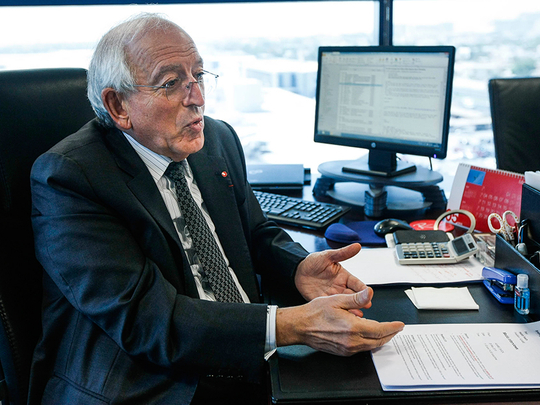
Dubai: Conflicts in the Middle East are prompting the region’s governments to order new military hardware from Airbus Group, said a senior regional executive this week.
The European defence and aerospace company has sold a number of EADS CASA C-295’s, a turboprop tactical military transport aeroplane, to “at least three countries” this year said Habib Fekih, President of Airbus Group, Africa and Middle East, in an interview at his offices in Dubai on Tuesday.
Fekih said the number of regional year-to-date sales of the C-295 were in the “double digits”.
Airbus is securing military hardware sales with Middle East governments during a period of sustained low oil prices, the main economic contributor of most countries in the region. But the rise of Daesh in Iraq, Syria, Libya and the toppling in Yemen of the Western and Saudi-backed President Abd Rabbo Mansour Hadi by the Houthi rebels has meant governments are engaged in a number of regional conflicts and are spending.
“When there is a need to buy, they buy,” Fekih said.
“The crisis is generating a need for some replacement [and] for the increase in hardware, particularly in transport aircraft and fighters and other aircraft,” he added.
Airbus hopes to finalise sales with regional governments for sales of several A330 Multi Role Tanker Transport (MRTT) aeroplanes, used for aerial fuelling. Fekih said the Group was in the middle of negotiations with the various countries in the region.
Qatar ordered two of the new generation air-to-air refuelling aeroplanes for its air force earlier this year and the UAE and Saudi Arabia also use the aeroplane.
Airbus is also trying to drum up interest for its A400M transport aeroplane that has so far only secured one customer, Malaysia, outside of launch customers Germany, France, Turkey and the United Kingdom.
Earlier this month, European militaries suspended A400M operations after one of the aeroplanes on its maiden test flight crashed in Spain shortly after take-off, killing four and injuring two.
Fekih said he did not believe the accident in Spain will affect Middle East appetite for the airlifter.
“We see a need for the A400M [in the region],” he added.
Middle East carriers
Airbus is also seeing continued appetite for its commercial aircraft with the region home to the three airlines that have shifted the industry eastward; Emirates, Etihad Airways and Qatar Airways.
Middle East airlines recorded double digit passenger traffic in two of the first three months of the year, according to the International Air Transport Association (IATA).
“This is translating into deliveries and new orders” Fekih said, however, pointed out that the conflict that is prompting defence sales is stalling some commercial business.
“Some countries are not buying. They are idle these days for obvious reasons because they are in the middle of wars,” he said.
Meanwhile, Emirates has been calling on Airbus to commit to a more fuel efficient version of the world’s largest passenger plane, the A380. Emirates is the biggest operator of the A380 with 61 in its fleet from an order of 140. The airline’s President Tim Clark has said he would like to see a 10 to 12 per cent fuel improvement in an A380neo (neo engine model). Qatar Airways Chief Executive Akbar Al Baker chimed in this month saying the improvement could be 10 to 15 per cent. Qatar Airways has ordered 10 of the A380s.
“We hear loud and clear all the comments of the customers and if its feasible economically and technically then of course we’ll do it,” said Fekih who admitted that “there are possibilities to get double digit gains”.
But Airbus believes that the current A380, which has seen slight improvements since it launched a decade ago, is “much better and much more profitable than the competition”.
“Each airline is saying they have the highest load factor in the fleet in the A380 and each one of them are saying they are making the best profit out of it and this started with the oil price above $100 a barrel,” Fekih said.










